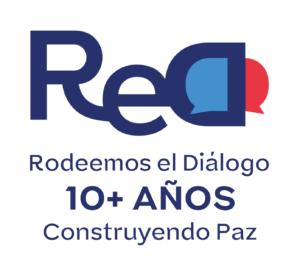Press Release Rodeemos el Diálogo (ReD) on the recent agreement regarding the Integrated System of Truth, Justice, Reparation and Non-Repetition to satisfy victim’s rights.
15th December 2015
Today is a great day for Colombians, in particular for the more than seven million victims of the prolonged civil war in Colombia. From Armenia, Bogotá, Calarcá, Cajicá, Medellín, Pereira, Salento to London and Barcelona, we are glad to learn of the recent agreement to satisfy victims’ rights.
In Rodeemos el Diálogo (ReD), we acknowledge that for both negotiation teams the Colombian government and FARC guerrillas it has been a tough challenge to agree upon an integrated system of truth, justice, reparation and non-repetition. Responding to the demands of the victims of the Colombian armed conflict required implementing direct participation mechanisms and practising self criticism. Therefore, around 3,000 victims participated in four forums organised by the UN and the Universidad Nacional in Colombia, and 60 victims travelled to La Havana to make their voice heard, offering their testimonies and advice. They shared their memories and experiences with the negotiators in La Havana, came together to express their demands and created initiatives for forgiveness and reconciliation. This demonstrates the key role that the victims played and the importance given to them by both negotiation teams. At the same time, it was imperative for the government to comply with standards of international justice. Despite many pressures that both teams experienced, they maintained their will for peace; it set an example of national reconciliation and established strong foundations for the reconstruction of the social fabric (a task that requires the participation of all Colombians).
There are five mechanisms within the Integrated System of Truth, Justice, Reparation and Non-Repetition which provide a distinctive, territorial and gender focussed approach; these are exemplary for other peace processes in the world. The parties’ committment to reaching peace and avoiding impunity has been established through the creation of ‘La Comisión de Esclarecimiento de la Verdad, la Convivencia y la No Repetición’ (the Commission for the Clarification of Truth, Co-existence and Non-Repetition); La Jurisdicción Especial para la Paz (the Special Jurisdiction for Peace); and ‘La Unidad de Búsqueda de Personas Desaparecidas’ (the Unit for the Search for Disappeared People). A separate unit committed to investigating and dismantling criminal organisations, as well as other mechanisms to secure non-repetition, will be discussed as part of the third point on the agenda regarding the end of the conflict. This holistic approach guarantees a secure and complementary framework.
In ReD, we support the declaration of victims. We call for diligent investigation of threats against members of the victims’ delegations in Havana, and we reiterate the request we made of the Prince of Wales when he travelled to Colombia in 2014, in the sense that we hope the international community will closely follow these agreements to ensure that victims rights are respected. We trust that the Colombian government will spare no effort to set a precedent for non-repetition, thereby demonstrating that no-one in our country can re-victimise other Colombians without sanction.
ReD echoes the words of the government’s chief negotiator: No hay violencia buena; las violaciones de un lado no justifican las del otro (There is no ‘good violence; and violations from one side do not excuse the others). We also note those of FARC’s chief negotiator: “No nos interesa ver en la cárcel a nuestros enemigos, preferimos trabajar con ellos reconstruyendo el tejido social para satisfacer los derechos de las víctimas. ( We are not interested in seeing our enemies in jail, we would rather work with them rebuilding the social fabric (…) to satisfy the rights of the victims). We consider that both positions demonstrate the importance of restorative justice. Prison will apply for those that do not recognise their direct or indirect involvement and/or responsibility in internationally-recognised grave crimes. Again, this is exemplary for all Colombian society, because not even highly positioned government employees will have immunity before the ‘Jurisdicción Especial de Paz’, the Special Jurisdiction for Peace.
We think it is very important that those who do not recognise their responsibilities, be investigated, judged and sentenced to prison terms in ordinary conditions. This measure against impunity guarantees that victims and Colombian society can be sure that one of the components of peacebuilding, in addition to knowing who has been found guilty, is the full application of the rule of law.
Understanding and assuring that parties adhere to this agreement will not be easy; explaining it will require the efforts of many Colombians. In ReD, we will continue working on the pedagogy of the peace process, and creating strategies to reach increasing numbers of people, so that they may become peacebuilders in their places of work, their homes and in their everyday lives, and so that the peace agreement has the broadest possible approval amongst citizens. We will seek to create links between more sectors; everyone will be welcome in ReD. We believe that building peace is only possible if we recover a sense of honesty, generosity, solidarity and respect for difference; if, amongst us all, we build a culture of dialogue to live in a fairer, more wholesome society.

Souurce AFP
